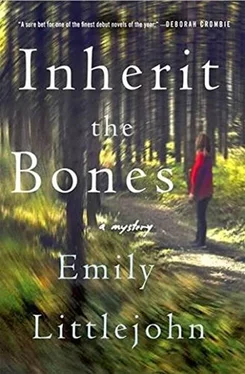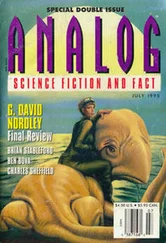“It wasn’t a damn love letter, Finn. Sam finds it and a few hours later, he’s nearly dead.”
I slammed on the brakes so hard the car spun to the side. Finn’s hand hit the dashboard with a thump. Behind me, a Volkswagen honked, long and loud. I released the brake and slid forward until I was parallel with the curb. “Son of a bitch. How did he know?”
“Don’t ever do that again. I know it must be real rare for you to get an epiphany but shit, my elbow feels like it’s in my shoulder,” Finn said. He massaged his arm and started rolling his neck in a slow, loose circle. “How did who know what?”
I stared out the window and talked to myself. “Three possibilities. Sam’s phone is tapped. My phone is tapped. Sam told someone.”
“Four. Sam was being watched,” Finn said, picking up on my train of thought.
Shaking my head, I said, “No, that doesn’t make sense. You said it yourself; Sam wasn’t a player in the investigation. Why watch him?”
I restarted the car and drove slowly. “If you’re our guy, you watch me. Or you-but not Sam.”
I ran through the sequence of events in my head. Sam finds the evidence sheet describing the piece of paper and the necklace. He calls me. Our call is interrupted-the guys are here, we’re going fishing. Sam is pumped. Maybe he talks, maybe it’s to Louis Moriarty. Sam asks Moriarty if he remembers finding the paper and the thin gold necklace tucked up high under Nicky’s bed. Maybe Moriarty does remember.
“Louis Moriarty was in the first truck, we know that for sure, right?”
Finn stopped rolling his neck and groaned. “Give it a rest, will you? It’s not Moriarty. And this isn’t the grassy knoll. He didn’t have a damn partner run Sam off the road.”
I parked outside of the narrow Victorian and checked the address. I turned to Finn.
“Okay, so maybe it’s not Moriarty. But you’ve got to admit, every damn thing seems to lead back to him,” I said.
I watched Finn gnaw on the toothpick. “I think you’ve got it backward. It all comes back to Nicky. He found something three years ago that made him run away. Then he came back. And someone, despite Nicky’s best intentions, recognized him and killed him. And now we’re on the same path Nicky was on, looking in the basement records, reopening old wounds. Only now, it’s us in the frying pan, getting picked off. One by one.”
Something about old wounds struck a chord in me. “It doesn’t all come back to Nicky. It all comes back to the McKenzie boys and the Woodsman. Without them, you’ve got Nicky alive and well, home for the summer from Yale or Harvard.”
“So what now?”
“We talk to the Kirshbaums.”
Canyon Kirshbaum was a large man in his late thirties. We sat in his backyard, sipping iced tea poured from a crystal pitcher, with slivers of lemon rind and honey. The bench Kirshbaum sat on was low, and his massive thighs puddled around him like ice cream melting on a hot day. He wore a charcoal suit and an ivory dress shirt with the first few buttons open, and dark shoes that shined from a recent polish.
Kirshbaum was a gracious host. “How’s the Lipton? More honey? We purchase it at the farmer’s market on Tenth and Spruce. There’s a lovely young woman, a Haitian, who does a wildflower blend infused with Palisade peaches. It is simply divine.”
“That sounds wonderful, this tea is just fine as is,” I said. “This is a lovely garden.”
Kirshbaum glanced around the expansive yard as though seeing it for the first time. The space was narrow and long, with enough shade to be pleasant and enough sun to grow spectacular plants.
“My wife’s got the green thumb. I don’t get out here often enough to enjoy it,” Kirshbaum said. He mopped at his brow with a pale lavender handkerchief. “I couldn’t tell you the names of half these things. I have a law degree with honors from Chicago, but I can’t tell a rose from a lily.”
I pointed to a particularly stunning flower with scarlet petals that looked like velvet and had a heady, sweet perfume. “That’s a rose.”
Kirshbaum smiled. His lips were thin and his teeth large and he said, “Yes, I suppose I was exaggerating. Perhaps I should have said I can’t tell the difference between an amaryllis and an orchid.”
I shrugged. “A flower is a flower is a flower… Anyway, we don’t want to take up any more of your time than we have to. Thanks again for meeting us; we could have come to your office.”
Kirshbaum waved a dismissive hand. “My office is a disaster. We’re remodeling and there’s junk everywhere. My wife will be glad someone’s using the yard. She’s out of town at the moment and my mother lives with us, so this is good. I can keep an eye on her and give the day nurse a few hours off.”
Finn swallowed the last of his iced tea and sucked on the lemon rind for a minute before spitting it back into the glass. “I don’t know how much my partner told you, sir, but it seems like it’s really your mother that we need to talk to.”
Kirshbaum stared at Finn. “I have to tell you, my mother does have her moments. But to be honest, she’s been in and out of it for months. I’m surprised she was able to place a call to the police station.”
Kirshbaum poured Finn another glass of the tea and topped mine off.
“Well, your mother was quite insistent that she speak with someone, and we’re obligated to follow up on any leads. As you probably know, we’re investigating a homicide-”
“Ah, the Bellington boy, correct?”
“Yes, Nicholas Bellington. Did you or your mother know him? Or the Bellington family?”
Kirshbaum leaned back and steepled his fingers and thought a few minutes. “Well, of course, his father Terry is the mayor so we’re familiar with the name. But personally, no, I don’t think so.”
He mopped his brow again and then stuck the lavender handkerchief in his breast pocket. Then he leaned over and snapped the red velvety rose off at the stem with his fingernails. The chlorophyll from the plant left thin green stains under his thumbnail.
Kirshbaum slid the flower across the table to me. “A rose for a rose. Let me see if my mother is awake. I’ll be right back.”
He pushed himself off the bench and ambled through the back door and into the house, out of sight. I stood and leaned back, my hands on my hips, and caught a glimpse of another rose bush, brimming with flowers of the most unusual shade of pale purple. The bush bloomed along the back wall of the garden, a good fifteen feet away.
“Have you ever seen roses that color, Finn?” I asked, and he shook his head, distracted by the ring of his cell phone. I picked my way along the flagstone path until I stood before the bush, admiring the flowers.
As I turned to leave, I stubbed my toe on the base of an alabaster birdbath, nearly hidden from sight by an aggressive vine that wrapped itself around the marble like a vise.
The basin held a few inches of stagnant olive-green water, thick with slimy, moldy leaves. A pair of mosquitos buzzed just above the surface, their tiny bodies throbbing like microscopic drones. I backed away and when I did, I saw a plaque at the base of the column of the birdbath. The vines were pushed back and I saw the plaque bore an inscription, and a raised relief of children dancing, holding hands in a circle.
Two boys.
I slowly walked back to Finn, and Canyon Kirshbaum, who’d returned. They were deep in conversation when I interrupted.
“Sir, did you grow up here?” I asked. “In Cedar Valley?”
He nodded. “Born and bred. Aside from school in Chicago, I’ve been here ever since.”
“And your mom, she was an artist?”
He nodded again. “In her younger years, she was quite wonderful. She painted, drew, even dabbled in sculpture. How did you know that?”
Читать дальше

![Лаура Бренз - Потомственная ведьма[Inherit the Witch]](/books/79609/laura-brenz-potomstvennaya-vedma-inherit-the-witch-thumb.webp)










